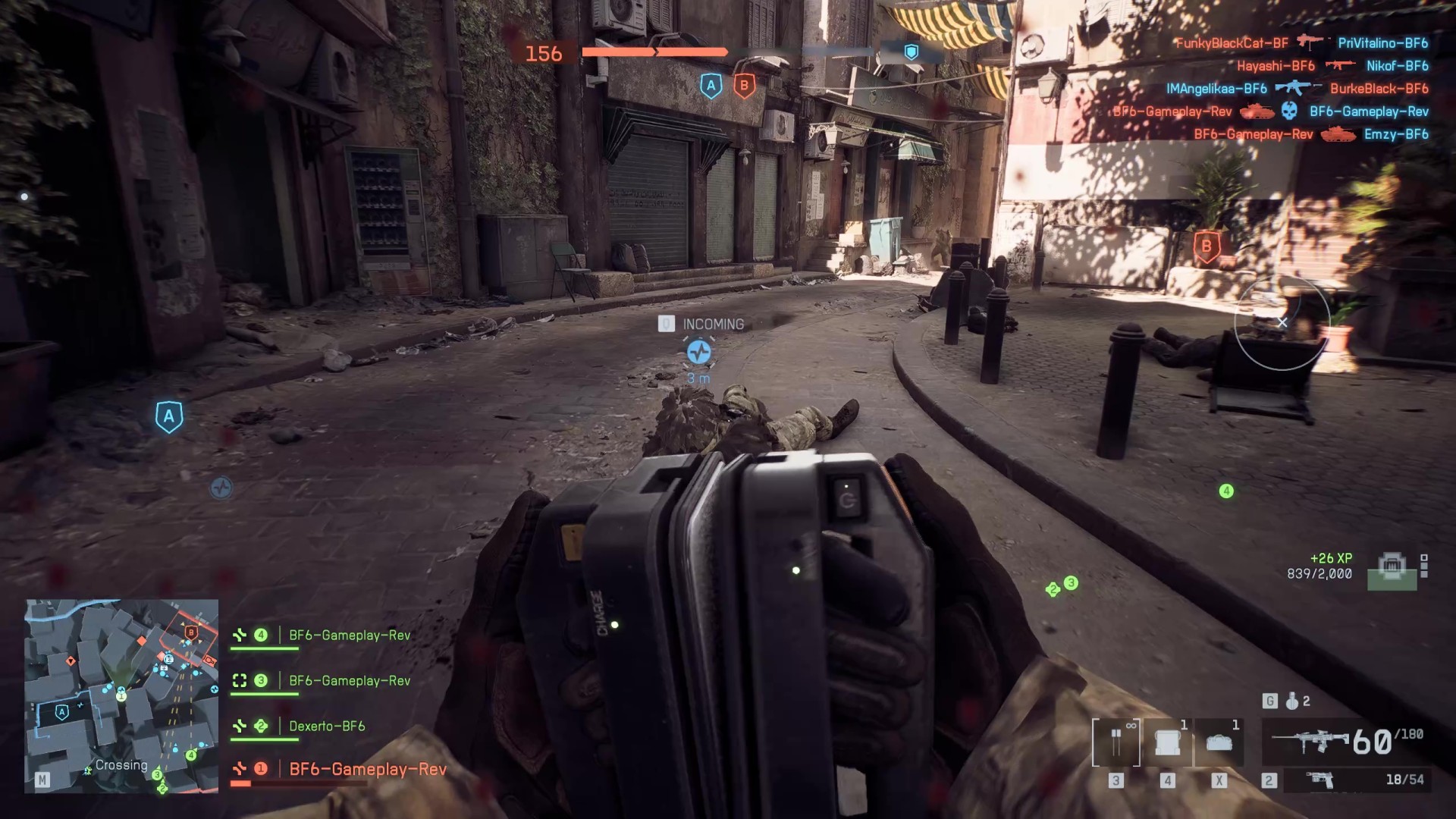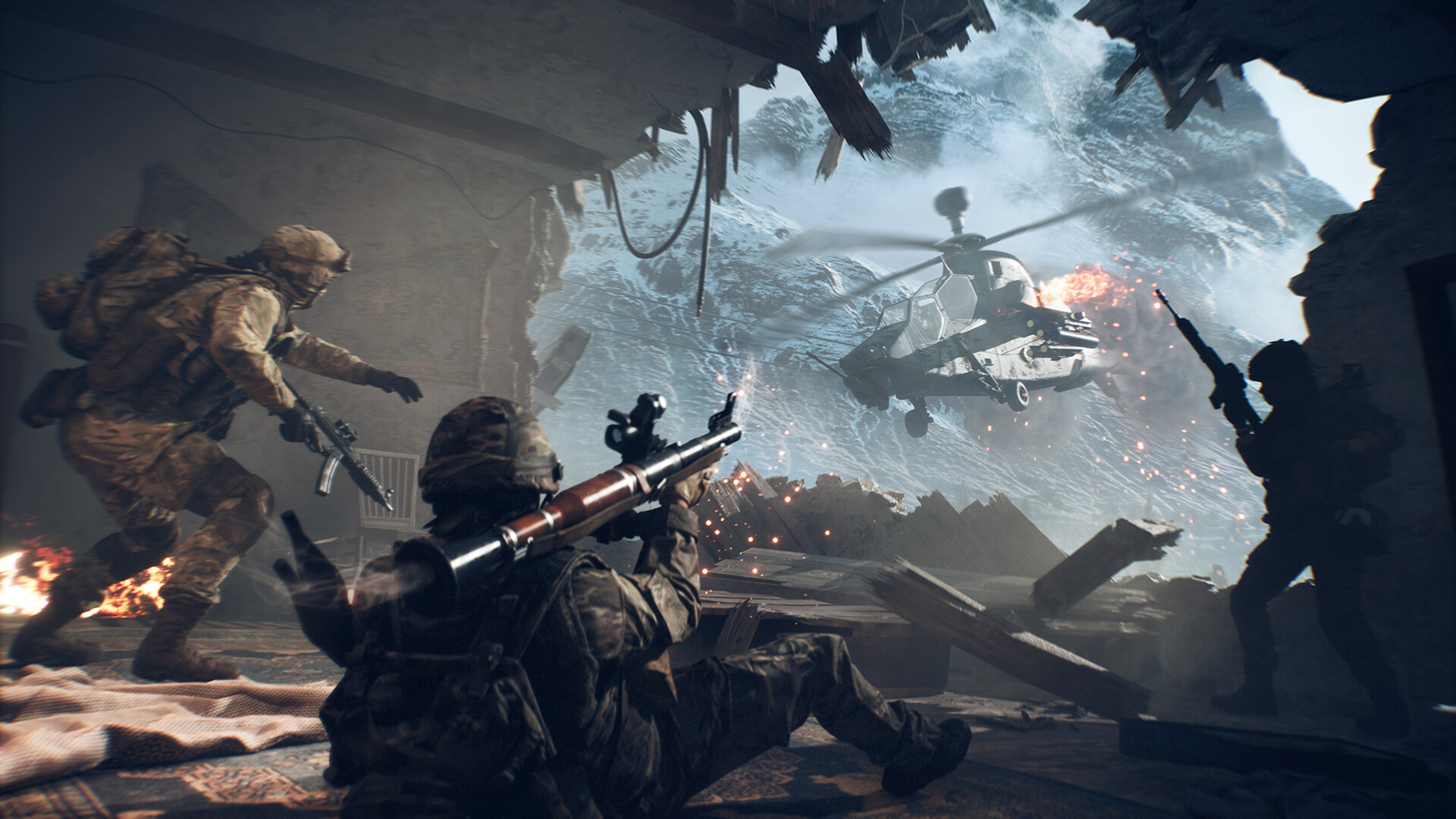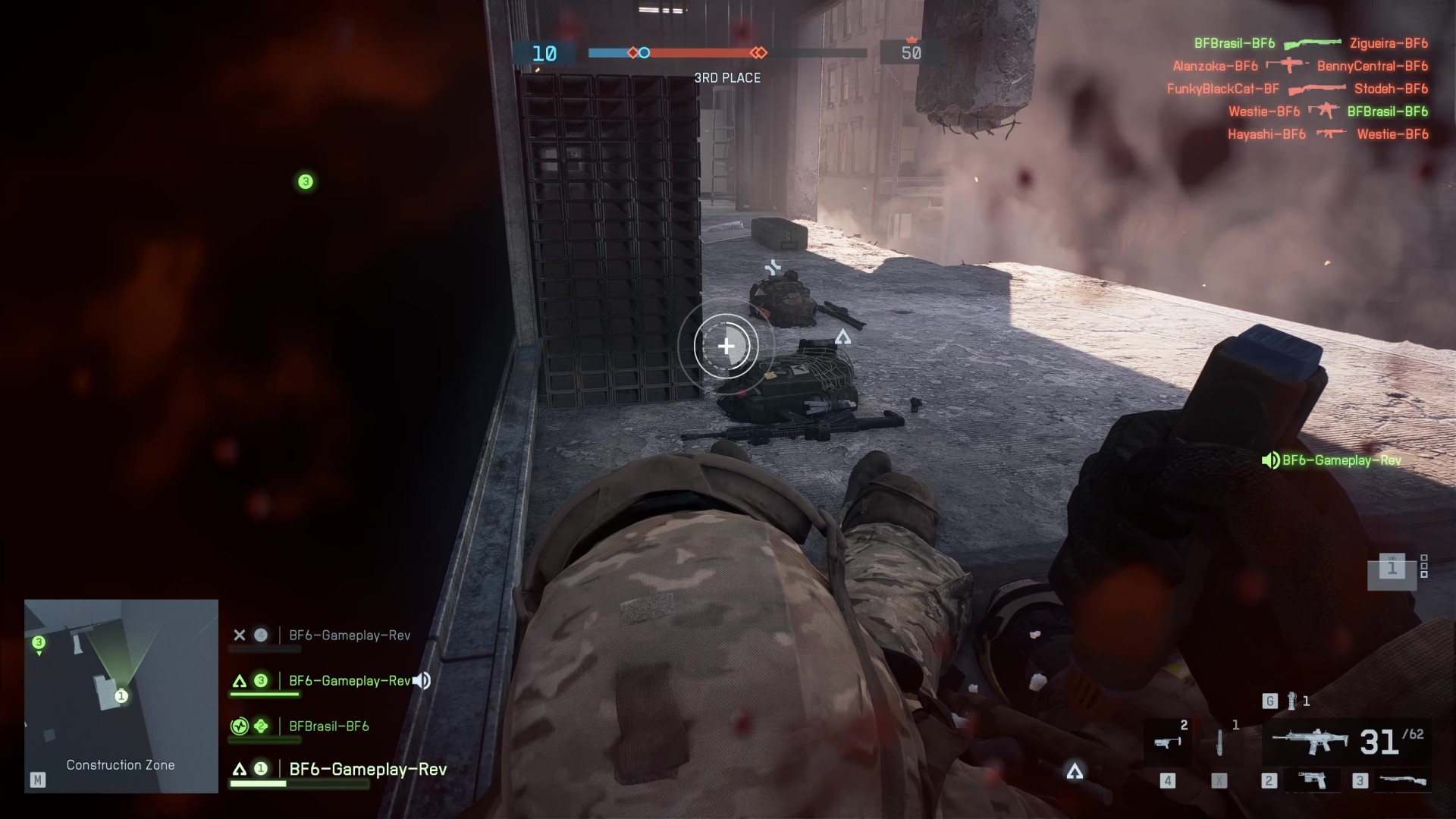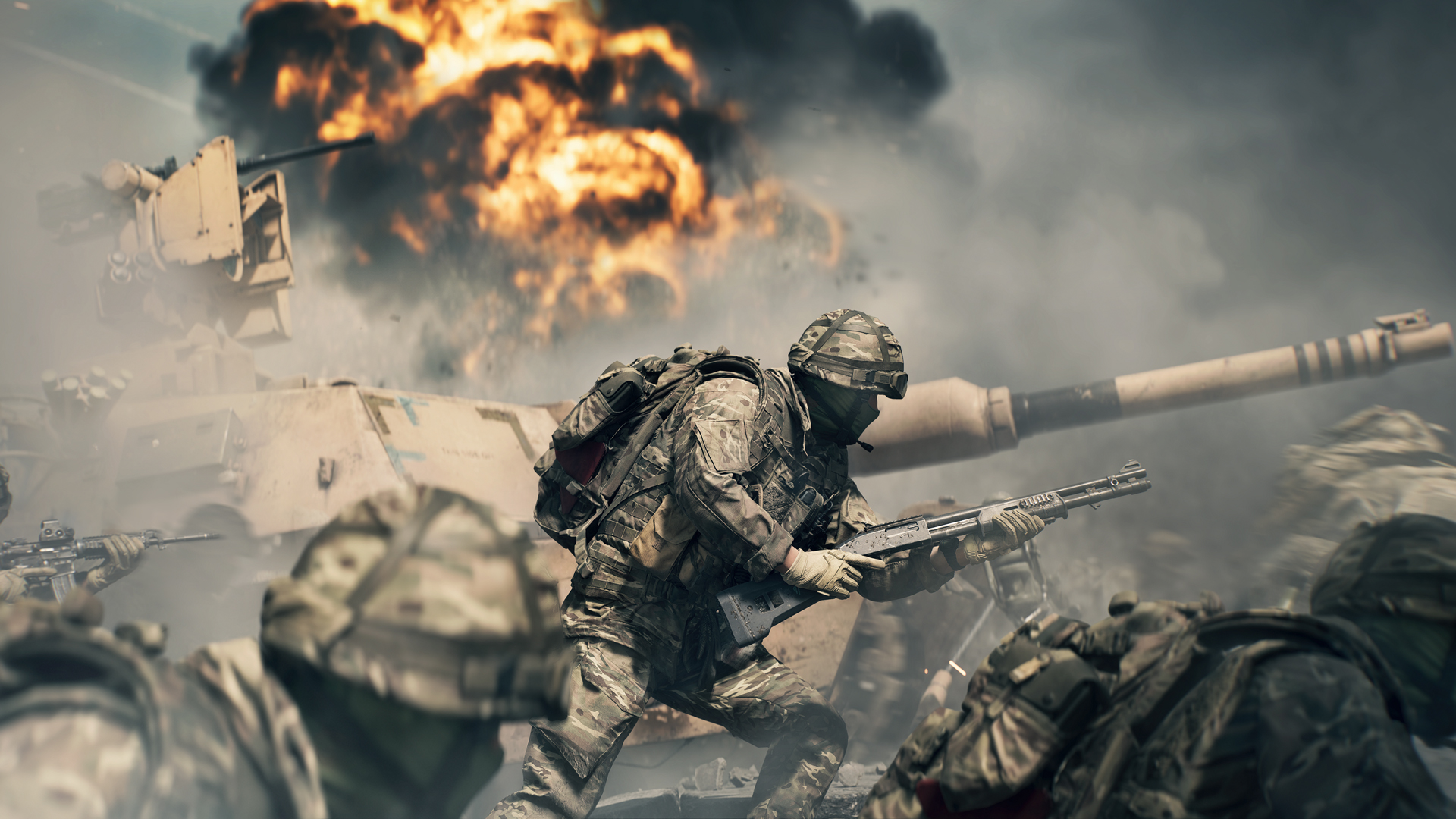Here's a PSA to all Battlefield 6 beta players: Please don't ignore your medic duties, I promise it'll make this explosive FPS even more enjoyable for everybody

Weekly digests, tales from the communities you love, and more
You are now subscribed
Your newsletter sign-up was successful
Want to add more newsletters?

Every Friday
GamesRadar+
Your weekly update on everything you could ever want to know about the games you already love, games we know you're going to love in the near future, and tales from the communities that surround them.

Every Thursday
GTA 6 O'clock
Our special GTA 6 newsletter, with breaking news, insider info, and rumor analysis from the award-winning GTA 6 O'clock experts.

Every Friday
Knowledge
From the creators of Edge: A weekly videogame industry newsletter with analysis from expert writers, guidance from professionals, and insight into what's on the horizon.

Every Thursday
The Setup
Hardware nerds unite, sign up to our free tech newsletter for a weekly digest of the hottest new tech, the latest gadgets on the test bench, and much more.

Every Wednesday
Switch 2 Spotlight
Sign up to our new Switch 2 newsletter, where we bring you the latest talking points on Nintendo's new console each week, bring you up to date on the news, and recommend what games to play.

Every Saturday
The Watchlist
Subscribe for a weekly digest of the movie and TV news that matters, direct to your inbox. From first-look trailers, interviews, reviews and explainers, we've got you covered.

Once a month
SFX
Get sneak previews, exclusive competitions and details of special events each month!
Here's a statement that shouldn't surprise anybody who deployed into a certain early access beta last weekend: Battlefield is so back. As a 20-year veteran of this franchise, I can't even begin to tell you how great it feels to have Battlefield 6 pushing the series back to its best. Especially, after all those years spent wandering the wilderness that is the modern live-service shooter landscape.
Honestly, I had such a good time with the early Battlefield 6 beta access that I don't even feel it is all that necessary to heavily relitigate the mistakes that were made with Battlefield 2042. The past is the past, and developer Battlefield Studios has clearly learned the right lessons: the maximum supported players has been reduced from 128 to a more reasonable 64, the setting has been refocused towards modern warzones, the maps are foundationally tighter, responsive destruction is widespread, and specialized classes are back in action. It's all happening.

What isn't happening, however, are certain groups of players taking their Combat Medic responsibilities seriously. And listen, this isn't the only problem spotlighted in the Battlefield 6 beta. For all the praise I'm throwing around here, I do still have concerns about weapon balancing, engagement times, and the overall pace of action. I'm confident that Battlefield Studios will tweak these elements as we march down the road to the October 10, 2025 release; the TTK will widen, just you wait.
What I'm less confident in is the TTE – Time To Educate. With launch just months away, is there enough time for the Battlefield Studios to properly teach first-time Battlefield players – whether they are only just coming of PEGI age, or flocking in from the likes of Call of Duty, Fortnite, and other shooters – the benefits of strict role-play across snaking battlefields defined by degrees of all-out carnage? Maybe, but I'm not super confident in that after the first weekend. FYI: Details on the next Battlefield 6 beta dates are right here, if you need them.

Still, Battlefield 6 (like the best Battlefield games before it) shines brightest when players assume a role and tailor their approach to encounters around it. Where Call of Duty thrives on giving every soldier some big 'Main Character Energy', Battlefield always succeeds when it makes you feel like a cog in a far larger war machine. Victories earned in inches, as squads rally around forward momentum rather than some brazen desire to have a positive K/D ratio.
Let's consider the Battlefield 6 classes for a second. You have Assault players assembling shifting frontlines, pushing towards objectives with force; Recon players forcing enemies out from the open and into cover, acquiring targets that benefit your entire squad; Engineers deploying critical repairs, ensuring that Main Battle Tanks and Infantry Fighting Vehicles are in play for as long as possible. And then there's my favorite of the lot, the Support: the medic class in all but name, and the only one which is truly capable of stopping Reinforcement tickets from bleeding out.
I hate to make sweeping generalizations, but it's pretty easy to separate the Battlefield veterans from the new blood in that first Battlefield 6 beta weekend. Particularly when you're in a downed state: returning players are the ones charging into fire while charging up a defibrillator, the newbies (I'd wager) are the ones stepping over bodies, ignoring repeated cries for help with a thundering LMG in-hand. No judgement here, we've all been there – but my point still stands.
Weekly digests, tales from the communities you love, and more
Obviously, you can play Battlefield 6 however you want to play Battlefield 6. I'm not the fun police. But I can promise that you'll have an even better time if you play your role – so will the people around you. For starters, the win/loss condition for just about every Battlefield 6 mode surrounds the diminishing supply of Reinforcement tickets – one death equals one fewer ticket, and one fewer ticket means you're one step closer to losing. A revive, whether it's with the Support-exclusive defibrillator gadget or the truly awesome new drag-and-revive system, saves a ticket and gets another player back in the fight. If you want to win more games, then more Combat Medics need to be in the fray.
Back in the fight

Are you trying to be the best Combat Medic you can be, but need a hand with the particulars? Then take a look at our guide on how to revive in Battlefield 6.
There are additional benefits to properly playing as a Support too. They have a deployable Supply Bag which not only heals allies within its vicinity but resupplies weapon and gadget ammo too. (If you ever hear soldiers around you requesting ammo, remember that you're the only one who can help here.) The Support's signature weapon, the almighty LMG, not only chews through targets at medium range but has the added benefit of enacting a strong Suppression Effect on any enemy caught in the crossfire – this severely reduces their passive health regeneration, prolonging encounters as your squad waits for reinforcements. Honestly, as far as I'm concerned, the LMG L110 is one of the best Battlefield 6 guns once you give it a couple of key attachments. And actually, let's swing back around to the defibrillator again: it can not only revive your team mates quickly it can also be used to down enemies too, so remember that next time you're camping corridors in the Siege of Cairo and other small Battlefield 6 maps.
And as I wrap up my love letter to not only playing as a Support but to any of you who also fully dive into the fantasy of keeping the gears of war turning, let me say this: if you take the role of Combat Medic seriously, and start pushing those revives up beyond 30 or 40 a game, you will land in the upper third of the scoreboard. Battlefield 6 rewards being a team player, so reviving all of those screaming allies around your feet is just as viable for individual success as equipping one of those outrageously overtorqued shotguns and blasting your way across control points.

Like I said, play however you want to play – Battlefield offers so many opportunities to find your role, and is a hell of a good time no matter what you ultimately land on. But the Support/Medic class really is a huge differentiator in the FPS arms race for Battlefield, the sort of experience which – when engaged with on its own terms – is quite unlike anything else. There's this genuine thrill associated with running into the firing line and reviving two or three downed allies, and watching as they rise to their feet and begin pushing the frontline towards an objective forward; your resupplies becoming vital to squad depth and survivability as enemies charge the area; your heavy LMG fire chewing through points of cover and forcing enemies to flee positions.
I fell in love with Support in Battlefield 2: Modern Combat back in 2005 (yes, I had my PS2 online, and yes, nostalgia tells me that it was a great service) and I still love the class to this very day. So here's my promise to you: take a couple of hours this weekend to meet the Battlefield 6 Support Class on its own terms, be the very best team mate that you can be, and see if you fall in love with it too. And if you don't, then don't leap immediately back to Assault and start storming corners into kill zones – there isn't a squad in the world who wouldn't turn down a few more Engineers on the frontlines who know how to repair vehicles in Battlefield 6.

Josh West is Editor-in-Chief of GamesRadar+. He has over 18 years of experience in both online and print journalism, and was awarded a BA (Hons) in Journalism and Feature Writing. Josh has contributed to world-leading gaming, entertainment, tech, music, and comics brands, including games™, Edge, Retro Gamer, SFX, 3D Artist, Metal Hammer, and Newsarama. In addition, Josh has edited and written books for Hachette and Scholastic, and worked across the Future Games Show as an Assistant Producer. He specializes in video games and entertainment coverage, and has provided expert comment for outlets like the BBC and ITV. In his spare time, Josh likes to play FPS games and RPGs, practice the bass guitar, and reminisce about the film and TV sets he worked on as a child actor.
You must confirm your public display name before commenting
Please logout and then login again, you will then be prompted to enter your display name.


